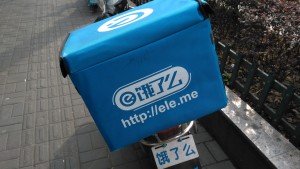INTERNET: Overindulged O2O Takeout Dining in Need of Cleanup
Bottom line: Beijing and local governments should move more aggressively to regulate O2O takeout dining services, and encourage consolidation around 2-3 players with the scale and resources to ensure the sector’s healthy development.

New signs of overheating emerged in China’s online takeout dining realm last week, as one of the nation’s top players and a smaller rival landed major new funds to fuel their money-losing operations. The pair of deals saw China’s two leading e-commerce companies, Alibaba (NYSE: BABA) and JD.com, collectively pump nearly $1.5 billion into new investments in the space, even as other major players like Tencent (HKEx: 700) and Baidu (Nasdaq: BIDU) are also beefing up their services.
The flood of new money has produced a rapidly escalating round of price wars, offering deals for consumers but creating chaos in the market and on the streets of major cities like Beijing and Shanghai. This kind of boom is quite typical for China’s emerging high-tech sectors, but in this case also poses unique challenges due to practical dangers such as threats to food and road safety.
CCTV recently exposed some of those issues in its annual Consumer Rights Day report in March, and big cities like Shanghai and Shenzhen have also taken recent steps to try and bring order to the marketplace. (previous post)
But these city governments and Beijing should be more aggressive in their efforts, which could even include centrally coordinated incentives that might encourage some of these companies to consolidate around 2 or 3 players that can be more efficient and easily regulated. The government’s failure to act more aggressively now will only lead to protracted price wars that will benefit nobody over the longer term, and will fuel chaos on city streets and in restaurants that could threaten public safety and health.
Investors have poured hundreds of millions of dollars into the Internet-based takeout dining sector over the last year, fueling explosive growth for the online-to-offline (O2O) business that connects takeout diners with thousands of restaurants using online ordering systems. The figures accelerated into the billions of dollars last week, as the resulting fight for market share drew in the nation’s two largest e-commerce companies.
The larger of the deals saw Alibaba and sister company Ant Financial announce they would invest $1.25 billion in Ele.me, China’s earliest major player in the space, confirming reports late last year that the pair were preparing to spend that amount for 27.7 percent of the company. (English article; Chinese article) Announcement of that funding comes just a week after media reported separately that Alibaba’s own rival Koubei online takeout dining service was seeking $2 billion in new funding.
JD, Dada Merge Takeout Businesses
Meantime, JD.com announced late last week that it would pool its own O2O takeout dining service, JD Daojia, with larger independent player Dada, creating yet another major new company in the space. (company announcement; Chinese article) As part of that deal, JD.com received 47 percent of the merged company and agreed to provide it with $200 million in new funding.
Alibaba and JD aren’t the only ones pumping major new money into the space. Tencent made headlines in January when it helped Meituan-Dianping, another major player, raise a whopping $3.3 billion to boost its operations. (previous post) And search leader Baidu has also been spending millions of dollars to build up its own rival service.
The flood of funds into the space has created chaos on the streets of China’s largest cities, which have become cluttered with different players’ delivery bikes parked outside restaurants, apartment buildings and riding through heavy traffic. The explosion has also raised the threat of unsafe food being sold over this lightly regulated sector. That element of the story was in the spotlight in March, when CCTV revealed in its annual Consumer Rights Day program that Ele.me’s online platform included many unlicensed restaurants.
Following the report, Ele.me promised to remove unlicensed restaurants from its platform and enact stricter procedures to prevent such eateries from getting into its system. Regulators in Ele.me’s hometown of Shanghai also launched a crackdown to rid the site of unlicensed restaurants. And in Beijing and Shenzhen, authorities have taken recent steps to curb the number of electric bikes and tricycles that are used to make most deliveries for both food and packages.
These steps all look positive and should help to address many of the smaller problems that have accompanied the O2O takeout dining boom. But more aggressive measures should be taken to counter the flood of investment coming into the sector. That could include tax, regulatory and other licensing moves that might encourage consolidation in the space, with an aim of creating two or three big companies that have the scale and resources to implement state-of-the-art systems that can ensure the industry’s healthy development.
Related posts:
- E-COMMERCE: Ele.me, Caixin Take Money, Keep Distance from Alibaba
- INTERNET: O2O Food Wars Overheat at Meituan, Ele.me
- FUND RAISING: Meituan-Dianping, JD Finance, Lufax Raise $5.5 Bln
- Today’s top stories
(NOT FOR REPUBLICATION)
